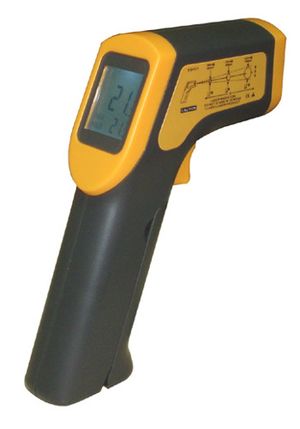Non-Contact Infrared Thermometers
Non-Contact Infrared Thermometer is a thermometer which infers temperature from a portion of the thermal radiation sometimes called blackbody radiation emitted by the object being measured. They are sometimes called laser thermometers if a laser is used to help aim the thermometer, or to describe the device's ability to measure temperature from a distance. By knowing the amount of infrared energy emitted by the object and its emissivity, the object's temperature can often be determined. Non-contact infrared thermometers are a subset of devices known as thermal radiation thermometers.
Sometimes, especially near ambient temperatures, false readings will be obtained indicating incorrect temperature. This is most often due to other thermal radiation reflected from the object being measured, but having its source elsewhere, like a hotter wall or other object nearby - even the person holding the thermometer can be an error source in some cases. It can also be due to an incorrect emissivity on the emissivity control or a combination of the two possibilities.
The most basic design consists of a lens to focus the non-contact infrared thermal radiation on to a detector, which converts the radiant power to an electrical signal that can be displayed in units of temperature after being compensated for ambient temperature. This configuration facilitates temperature measurement from a distance without contact with the object to be measured. As such, the non-contact infrared thermometer is useful for measuring temperature under circumstances where thermocouples or other probe type Sensors cannot be used or do not produce accurate data for a variety of reasons.
Some typical circumstances are where the object to be measured is moving; where the object is surrounded by an electromagnetic field, as in induction heating; where the object is contained in a vacuum or other controlled atmosphere; or in applications where a fast response is required, an accurate surface temperature is desired or the object temperature is above the recommended use point of a contact sensors, or contact with a sensor would mar the object or the sensor, or introduce a significant temperature gradient on the object's surface.
